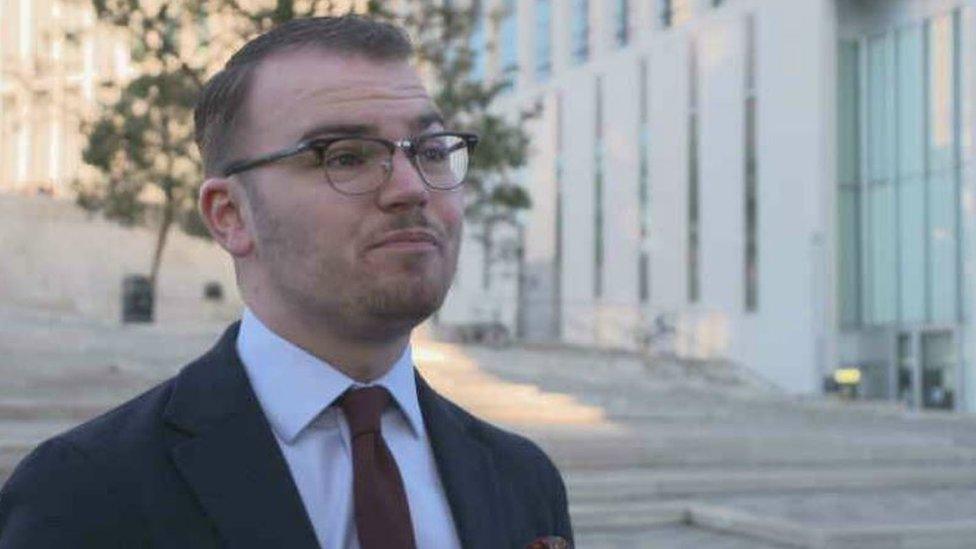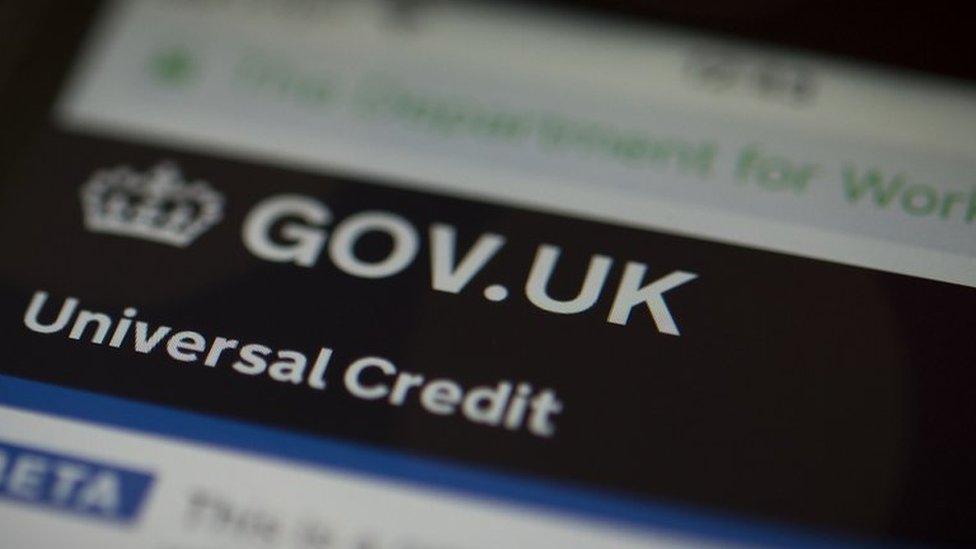Universal credit 'hits students harder'
- Published

Sandra Mitchell does not qualify for universal credit
Students who claim universal credit are being hit harder by reductions than people who are in work, according to the NUS.
Under universal credit, for every £1 that someone earns through work, they will see 63p deducted from their monthly payments.
However, for students, their loans and grants are treated as unearned income and therefore untaxed.
For each £1 they receive, they will lose the same amount from their claim.

NUS president Liam McCabe said the system primarily affected "vulnerable" students.
"It is student-parents and students with disabilities," he said.
"Those are the kinds of individuals who are taking the greatest hit on this."
The Department for Work and Pensions said universal credit helped people if they were on a low income or out of work.
It said people usually cannot get universal credit if they are studying full-time as student loans are expected to cover living costs.

Sandra would have qualified for child tax credits under the old system
Single mother Sandra Mitchell, 35, launched a petition about the issue after she found she didn't qualify for the new benefit.
She had previously received extra money under the old child tax credit system while working.
After she started her history and divinity course at St Andrews University, she lost about £240 a month in benefit money.
Ms Mitchell, from Dundee, told BBC Scotland the cut in her monthly income has threatened her place at one of the UK's most prestigious universities.
She said: "I'm the only person in the household who brings in any income. I'm left with just my student income as I don't get any universal credit.
"Under the previous system I would've still received child tax credits but under the new system I've lost out on that."
Ms Mitchell added: "It means that it's very difficult to focus on your studies when you're constantly worrying about finances, when you take into account your travel, your lunches, and books that can be very costly."
Universal credit completed its rollout for new claimants in Scotland on Wednesday.
The system combines six existing benefits - income-based Jobseekers' Allowance and Employment and Support Allowance, Income Support, Housing Benefit, Working Tax Credits and Child Tax Credits - into a single amount paid monthly.
Ms Mitchell receives about £675 a month from a student loan - repayable after graduation - as well as £217 from a lone parent grant and independent bursary.
She also receives about £300 from the University of St Andrews.
As a result, she has been told she earns too much to receive the equivalent child tax credits under the new system.
She claims that her £1,200-a-month budget is stretched when accounting for her rent, heating bills and travel expenses for her college student son Ciaran, 16.
"If my white goods went, or I needed clothes or shoes, I would really struggle," she said.
"It doesn't leave anything for incidentals. Am I going to have enough money to buy me and my son the winter coats that we need?"
She added: "The thing is I have to keep sticking at it is to set an example for my son. To say look, I can do it. I want better for you, so you do it as well.
"I'll find a way [to stay at university], by hook or by crook, because it would break my heart if I was to lose this."

NUS president Liam McCabe said the system primarily affects "vulnerable" students
The National Union of Students (NUS) Scotland said it had received a number of reports from students about issues around universal credit.
Last month, the organisation ran information workshops about the benefit for its members.
Mr McCabe said: "For many students, they are seeing their income on a monthly basis being reduced by up to £300."
He called for the universal credit system to be scrapped.
The Department for Work and Pensions said it did not hold data on how many students were currently claiming universal credit.
A spokeswoman said: "Student loan income is treated as 'unearned income' and all unearned income is taken into account pound for pound (unless disregarded in full) and is treated differently in an award of UC to 'earned income'.
"Essentially, the earned income attracts an earnings taper which means that for every pound earned the UC award is only reduced by 63p so to keep the financial advantage of working."
- Published5 December 2018

- Published5 December 2018
